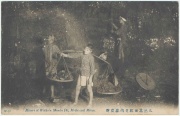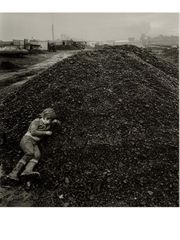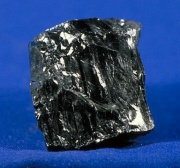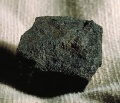Difference between revisions of "Coal"
| (3 intermediate revisions by 2 users not shown) | |||
| Line 1: | Line 1: | ||
| − | [[File:2002.7015-SC81803.jpg|thumb|]] | + | [[File:2002.7015-SC81803.jpg|thumb|Miike coal mines<br>MFA# 2002.7015]] |
== Description == | == Description == | ||
| − | + | [[File:John on the coal-MFA.jpg|thumb|Photograph of coal pile<br>MFA# 2017.1374]] | |
A naturally occurring dark brown to black combustible rock. Coal is found in nearly every region of the world; it is mined in Europe, Asia, Australia, and North America. Coal is composed of carbonized vegetable matter with small amount of [[hydrogen]], [[nitrogen]], [[oxygen]], and [[sulfur]]. Coal is classified by its carbon content. [[Peat]], the first stage in coal formation, is an unconsolidated deposit of semicarbonized plant matter. [[Lignite]], or brown coal, is the lowest rank of coal. It is a consolidated mass with a carbon content of less than 70%. The next level is bituminous, or soft coal. The highest metamorphic rank for coal is [[anthracite]]. It has a fixed carbon content between 92 and 98%. It is hard, black and has a semimetallic luster. Coal is primarily used as a fuel. It may have been used as a black pigment in oils and watercolor paints in the early 17th century. | A naturally occurring dark brown to black combustible rock. Coal is found in nearly every region of the world; it is mined in Europe, Asia, Australia, and North America. Coal is composed of carbonized vegetable matter with small amount of [[hydrogen]], [[nitrogen]], [[oxygen]], and [[sulfur]]. Coal is classified by its carbon content. [[Peat]], the first stage in coal formation, is an unconsolidated deposit of semicarbonized plant matter. [[Lignite]], or brown coal, is the lowest rank of coal. It is a consolidated mass with a carbon content of less than 70%. The next level is bituminous, or soft coal. The highest metamorphic rank for coal is [[anthracite]]. It has a fixed carbon content between 92 and 98%. It is hard, black and has a semimetallic luster. Coal is primarily used as a fuel. It may have been used as a black pigment in oils and watercolor paints in the early 17th century. | ||
| Line 9: | Line 9: | ||
peat; lignite; brown coal; bitumen; soft coal; anthracite; hard coal; trækul (Dan.); Kohle (Deut.); carbón (Esp.); charbon (Fr.); houille (Fr.); carbone (It.); steenkool (Ned.); kull (Nor.); carvão (Port.); | peat; lignite; brown coal; bitumen; soft coal; anthracite; hard coal; trækul (Dan.); Kohle (Deut.); carbón (Esp.); charbon (Fr.); houille (Fr.); carbone (It.); steenkool (Ned.); kull (Nor.); carvão (Port.); | ||
| + | == Risks == | ||
| + | Dust is toxic by inhalation. | ||
| + | |||
| + | Teck.com [https://www.teck.com/media/Bituminous-Coal-SDS.pdf SDS] | ||
| + | |||
| + | == Physical and Chemical Properties == | ||
{| class="wikitable" | {| class="wikitable" | ||
|- | |- | ||
| Line 15: | Line 21: | ||
| range from 1.2-1.8 | | range from 1.2-1.8 | ||
|} | |} | ||
| − | |||
| − | |||
| − | |||
| − | |||
| − | |||
| − | |||
| − | |||
| − | |||
== Additional Images == | == Additional Images == | ||
| Line 31: | Line 29: | ||
</gallery> | </gallery> | ||
| − | + | ==Resources and Citations== | |
| − | == | + | * J.Winter, "The Characterization of Pigments Based on Carbon" ''Studies in Conservation'', 28:49-66, 1983. |
* ''Van Nostrand's Scientific Encyclopedia'', Douglas M. Considine (ed.), Van Nostrand Reinhold, New York, 1976 | * ''Van Nostrand's Scientific Encyclopedia'', Douglas M. Considine (ed.), Van Nostrand Reinhold, New York, 1976 | ||
Latest revision as of 13:02, 31 August 2020
Description
A naturally occurring dark brown to black combustible rock. Coal is found in nearly every region of the world; it is mined in Europe, Asia, Australia, and North America. Coal is composed of carbonized vegetable matter with small amount of Hydrogen, Nitrogen, Oxygen, and Sulfur. Coal is classified by its carbon content. Peat, the first stage in coal formation, is an unconsolidated deposit of semicarbonized plant matter. Lignite, or brown coal, is the lowest rank of coal. It is a consolidated mass with a carbon content of less than 70%. The next level is bituminous, or soft coal. The highest metamorphic rank for coal is Anthracite. It has a fixed carbon content between 92 and 98%. It is hard, black and has a semimetallic luster. Coal is primarily used as a fuel. It may have been used as a black pigment in oils and watercolor paints in the early 17th century.
Synonyms and Related Terms
peat; lignite; brown coal; bitumen; soft coal; anthracite; hard coal; trækul (Dan.); Kohle (Deut.); carbón (Esp.); charbon (Fr.); houille (Fr.); carbone (It.); steenkool (Ned.); kull (Nor.); carvão (Port.);
Risks
Dust is toxic by inhalation.
Teck.com SDS
Physical and Chemical Properties
| Density | range from 1.2-1.8 |
|---|
Additional Images
Resources and Citations
- J.Winter, "The Characterization of Pigments Based on Carbon" Studies in Conservation, 28:49-66, 1983.
- Van Nostrand's Scientific Encyclopedia, Douglas M. Considine (ed.), Van Nostrand Reinhold, New York, 1976
- Random House, Webster's Encyclopedic Unabridged Dictionary of the English Language, Grammercy Book, New York, 1997
- The American Heritage Dictionary or Encarta, via Microsoft Bookshelf 98, Microsoft Corp., 1998
- CRC Handbook of Chemistry and Physics, Robert Weast (ed.), CRC Press, Boca Raton, Florida, v. 61, 1980 Comment: density for bintuminous coals=1.2-1.5; for anthracite coals=1.4-1.8
- Richard S. Lewis, Hawley's Condensed Chemical Dictionary, Van Nostrand Reinhold, New York, 10th ed., 1993
- G.S.Brady, Materials Handbook, McGraw-Hill Book Co., New York, 1971 Comment: p. 201
- Michael McCann, Artist Beware, Watson-Guptill Publications, New York City, 1979
- R.D. Harley, Artists' Pigments c. 1600-1835, Butterworth Scientific, London, 1982
- Art and Architecture Thesaurus Online, http://www.getty.edu/research/tools/vocabulary/aat/, J. Paul Getty Trust, Los Angeles, 2000




